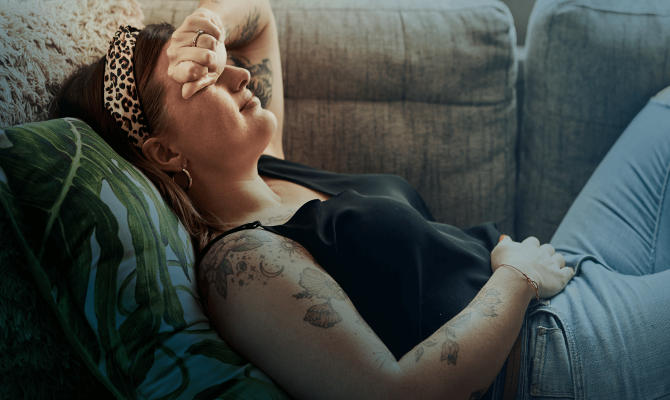Concussion: Your questions answered
28 Feb 2022

What is concussion?
A concussion is also known as a mild traumatic brain injury. Your doctor might call it an “mTBI”.
Concussion is caused by a sudden, external force to the head, such as a knock or whiplash movement. It causes a shake to the brain inside the skull, which means brain cells get stretched and temporarily compromised causing disturbance to the brain’s regular functions.
You don’t need to be ‘knocked out’ to have a concussion, but you might instead feel dazed, weird, and not yourself afterwards.
In this article, we answer commonly asked questions about concussions and what you can do if you think you’ve had one.
What are the signs of a concussion?
Everyone experiences a concussion differently.
This means concussion symptoms can vary from person to person including in the intensity, frequency and duration they are experienced. Symptoms are a normal byproduct after sustaining an injury.
Symptoms and signs of a concussion may include:
- Dizziness
- Blurred vision or light sensitivity
- Nausea or vomiting
- Headaches
- Fatigue or drowsiness
- Balance and coordination
- Anxiety, sadness, irritability or more emotional
- Neck pain or whiplash
- Difficulty concentrating, poor memory or confusion
- Sleep difficulties.
You may know someone affected by a concussion and know how much disruption it can cause to everyday life. People with a concussion sometimes talk about how it can take them longer to get from A to B than it did before their injury.
One way to explain this is to imagine you’re on the motorway on your morning drive. A concussion is like road works or closure on your normal route. This means you’ll need to take a detour to get to your destination. In the end, you will still arrive at your destination; however it might take you longer, use up more energy and feel a little frustrating.
You will still arrive at your final destination, but you may need to take a different route until the road works – your recovery – is complete. Read more about recovering from a concussion below.
Overview: Recovering from a concussion
Everyone’s concussion recovery journey is different.
Your recovery will depend on a number of factors which include how long it’s been since your injury, and other environmental factors like whether you’ve been able to rest or if in fact you’ve rested too much.
It can also depend on your level of activity before your injury. This means your work, sports, hobbies, home environment, responsibilities – for example, if you look after small children – these all influence your ability to recover quickly.
Most people who have a concussion recover within the first couple of weeks. However, some people take longer to get better and need some help to recover. If you feel you’re not getting better, you may need to be referred to ACC’s Concussion Service, a free programme where a team of experts help you to rehabilitate.
For some people having a concussion can be a bit scary. The most important thing to remember is that symptoms such as the list above are normal, and concussions are not permanent. If you’re needing a bit of support, make sure you check in with your GP and ask your whānau and friends for a bit of extra help in the day-to-day.
First steps: What to do if you think you’ve had a concussion
Important: If you have had a knock to the head and are experiencing any signs and symptoms listed above, you need to visit your GP or primary healthcare provider straight away. Don’t delay!
Your GP will assess your symptoms and make a diagnosis based on the symptoms you present. They will then provide initial advice and create a plan moving forward.
Most concussions get better within a few weeks, so you may find that some initial advice and support is all you need.
If your injury recovery is persisting longer than a week or two, your GP will likely refer you to the ACC Concussion Service.
Note: Habit Health holds the ACC Concussion Service contract, meaning we can provide this service for you if your recovery is taking a little longer than usual.
Many people ask if they should get a scan such as a CT scan for their concussion. But because most concussions don’t cause structural damage, it won’t show up on any scans.
A concussion can be diagnosed by assessing your neurological symptoms (vision, hearing, balance, etc.), your cognitive symptoms (memory and concentration) as well as your physical and emotional symptoms.
Concussion: tips for recovering at home
As we mentioned earlier, everyone's journey to recovery varies from person to person. We always recommend getting some advice from your GP or primary care provider first.
If you’re planning to recover from home, here are some common tips they might give you:
- Rest and take it slow for the first day or two.
- Resume light daily activities such as a leisurely walk
- Avoid activity that risks further head injury, i.e. bike riding or contact sport
- Avoid alcohol, caffeine or anything that upsets your body’s natural regulation
- Reduce stress and take care of yourself.
If you have been referred to the Concussion Service, your team of experts will give you exercises and activities to manage your symptoms. They will work with you to develop a plan to help you return to the things you love.
They might also assess your home and work environment and make recommendations to make it more comfortable for your recovery.
Your Concussion Service team may include an occupational therapist, physiotherapist, psychologist, neuropsychologist and a medical specialist, though it’s likely that you won’t need to see all of them. These people are all here to help you get better.
Click here to read more about Habit Health’s Concussion Service programme.